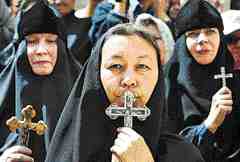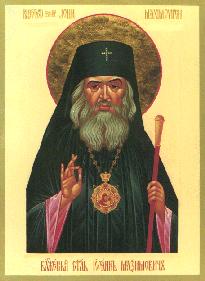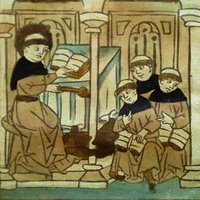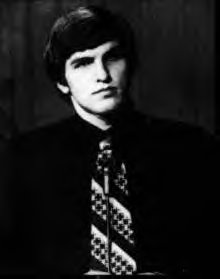Thoughts on Orthodoxy's "Eastern ghetto"

I think a lot of people in the Orthodox world, although they acknowledge the pre-schism Orthodoxy of the West, are content with importing specifically Eastern Christian things into modern Western Orthodoxy (meaning, in this case, Orthodoxy in the West) --Eastern Rites, the Philokalia, Byzantine chant. And, with these things, many Western converts become "Easternized." They gravitate more toward St. John Climacus rather than St. Benedict, for example. Not that this is wrong, it just seems strange to me.
I chant in a Byzantine style, I celebrate the feasts of Eastern Saints with Eastern liturgics, and yet I'm a product of Western culture, a descendant of Western Christians whose long-ago ancestors were Orthodox Christians who used Western Rites and Gregorian Chant, went on pilgrimages to Einsiedeln, Compostela, and Tours, blessed themselves with Holy Water, prayed in Latin, and fraternized with Benedictines. Their blood flows in my veins and their ideas still flow through Western culture, albeit obscured by godlessness as silt clouds a once pristine lake or river.
In sermons, I hear about the decrepitude of American/Western culture and how I should conform my life to the Church. That's all well and good because the Church is universal and its culture transcends all others. But at times it doesn't seem like my Church, while giving me, the individual, life and purity, is working very hard to heal my Western culture, to remove that which has polluted it, to cure its hurts and correct its thoughts. Sometimes it seems as if my Church would rather my Western culture be replaced entirely with something of a more singularly "Eastern" flavor.
The Orthodox Church, it seems today, wants to preserve itself as "Eastern," and so is not concerned with rediscovery of its Western past, traditions, and outlook. Sure, some books have been written about Western Orthodox Saints, and some jurisdictions have Western Rites blessed for use (albeit the users of these Rites are numerically miniscule and their practices are, wrongly, looked down upon by other Orthodox), but, as modern Orthodoxy has lived in the West for over a century, it only seems like Western converts are becoming more "Eastern" in their expression of Orthodoxy. Instead of a rediscovery of a lost Western heritage, converts mostly rush into the "Eastern" side of things, even to the point of viewing Orthodoxy as an Eastern religion, ignoring or being ignorant of Orthodoxy's Western heritage and Western incarnation. Some Orthodox even view the Western inheritance as something lost, mysterious, unknowable, or, worse, tainted by heretical trends like the Filioque or St. Augustine's theological mistakes.
This is a real shame. If the Orthodox Church in the West remains exclusively or predominately "Eastern" in its expression of Christian culture, I don't think it will outgrow its foreigness and exoticism enough to become for modern Westerners what it was for ancient Westerners--simply, the Church of Christ. True, real mission work is not about numbers, but it's also not just about the conversion of the individual. Classical Orthodox mission work has always focused on the society, the culture. Make the culture Orthodox, and it will support the people for generations. Westerners becoming Orthodox do not stop being Western culturally. Such a thing would be impossible. However, the current trend is that they are becoming Eastern in their spiritual and religious culture. Thus, what they have to offer by word and example to their non-Orthodox Western brethren, is a praxis which is foreign to Western culture because it did not develop in Western culture. Therefore, fellow Westerners will not necessarily recognize it as being something in which they can take part in a natural, familiar way. Orthodoxy does, however, have a particular Western praxis which developed in the Western cultural milieu. While it is Orthodox and Christian (and, thus, still strange to many Westerners), it is fundamentally familiar, and non-Orthodox Westerners will be able to view it as something which belongs to them.
There are a few things to keep in mind. 1). The Western Orthodox praxis is not a carbon copy of the Eastern Orthodox praxis. 2). It did not die in the East-West schism. 3). There's no manual on how to construct it. Just like with the Eastern praxis (unless someone is affecting it), it is intuitive and experiential and recognizable as piety. It's not about beards or rubrics or fasting rules--it's proper Church culture in Western form and you'll know it when you see it. How's that for an answer?
Maybe, eventually, we'll get to a point where an Eastern Rite priest can lead a Lenten retreat on St. Benedict's Holy Rule instead of St. John Climacus's Ladder of Divine Ascent without raising eyebrows. Perhaps statues of Our Lord, Our Lady, and the Saints will not be put in the same category with Hindoo idols. The shrine of St. Martin of Tours might one day recover its ancient status and receive more visitors than Disneyland. But none of this will happen unless the Orthodox of the West are willing to venerate the ancient Orthodox Saints, emulate them, learn from them, become like them in praxis of Orthodoxy. The culture and the religious and spiritual praxis of the individual should be of the same substance so as to avoid confusion and foster personal and cultural growth in the Faith. Individuals who have an inner cultural split of a kind such as this will be more likely to pass on such a split to their children and neighbors. And, if this cultural split is perpetuated amongst the Orthodox of the West, there is little hope of the Western culture becoming Orthodox again. The Western culture is sick because it has dispensed with it's appropriate spiritual and religious praxis. Grafting an Eastern spiritual and religious praxis on to the sickened Western culture runs the same risk of a mis-matched organ transplant--rejection.








4 Comments:
"There's no manual on how to construct it."
For those who are actually Western Rite (i.e. belong to actual communities), the Western Rite has been definitively established by legitimate authority, with specific liturgical texts, rules, guidelines, etc.
For Antiochians, there is a definite "manual" of sorts: the Western Rite Edict, and the Western Rite Directory. These documents have the authority of the Metropolitan and the Holy Synod. Until we hear again from these authorities (last time was in the mid 1990's), this is the way we do Western Rite, period.
Without definitive guidance from our hierarchs, "Western Orthodoxy" quickly descends into the chaos of "what I like" / "what I think is more Orthodox than X" / "my favorite golden age of liturgy" / "my favorite old Western Christian country or ethnicity."
No individual layman or clergyman should be allowed to determine "how to construct it." That's what distinguishes us from the vagantes, who love to the legitimate, canonical Western Rite, promulgate their own liturgical texts based on their own whims (often passed off as superior "scholarship").
I'm not trying to read the riot act; but as a member of the Antiochian Western Rite Vicariate, we don't see it this way.
Sorry. Second to last paragraph should read:
No individual layman or clergyman should be allowed to determine "how to construct it." That's what distinguishes us from the vagantes, who love nitpick the legitimate, canonical Western Rite, and promulgate their own liturgical texts based on their own whims (often passed off as superior "scholarship").
Thank you for your comments, Ben. I think, however, that you might have misunderstood what I was trying to say. I'm at fault in this to an extent because I had trouble articulating my thougts in this post.
First of all, let me say that, while I made mention of the Western Rite, I was not speaking primarily about it, but about Orthodoxy (Eastern and Western Rites)as it is practiced in the West, particuarly by Western converts.
Second, as for Western Orthodox praxis, I was trying to say that such is not rully encapsulated in any singular Rite or historical period. The definition I'm reaching for is something more open-ended. Just like one can't really fit Eastern praxis into a box, you can't do it with Western praxis. By praxis, I mean how Orthodox live and think, etc. I was also trying to tie it to Orthodox culture, something which also transcends Rites and liturgical useages. I wasn't, actually, even limiting myself to just a discussion of prayer, but of whole culture, Christian Orthodox culture.
I understand where you're coming from as far as vagants and the American impulse of making one's own way of doing things.
The points I was trying to make were, I think, these:
1. That, amongst the majority of Western converts to Orthodoxy, there is an ignorance of the Orthodox Western Heritage. Some think Western Orthodox practice (liturgical and non-liturgical), praxis (as defined above) and culture was a mirror image of the same Eastern ways. This, however, was (and, in some ways, is) not the case.
2. There is really only a token interest amongst most Orthodox in the Western pre-Schism heritage. There needs to be more interest, study, and attempts at emulation if a proper spiritual culture which is both Orthodox and Western is to be built in the West--no matter the Rite.
3. Many Orthodox pundits--converts and otherwise--push the Eastern heritage of Orthodoxy as a means of defining Orthodoxy against non-Orthodox Western faiths. This leads to the ancient Western Orthodox heritage being buried or swept under the rug in some cases.
4. The great majority of Western converts to Orthodoxy also, it seems, adopt a lot of what I call, for lack of a better term, "Easternisms." The examples I can think of right now amount to an absorption in Eastern ritual and books from Eastern perspectives. Some of these books will even speak negatively about the West, without making distinctions or explanations about Orthodoxy in the West. This has developed an acute anti-Western sentiment in not a few converts.
All this is unfortunate. It creates an Eastern element of spiritual culture in people whose culture is Western. Whether or not this is good or bad probably cannot be said. It seems, however, to be problematic for the future missions to more Westerners and also to the goal of building a Western Orthodox culture again, God-willing.
I hope that I've been able to clear up some things. Again, I'm not commenting on the Western Rites (modern or historical), but the greater context out of which these have come, Western Orthodox culture, spiritual and otherwise.
Until quite recently, in the UK at least, most converts to Orthodoxy were already Grecophiles or Slavophiles. When I was a child most of the people coming from Anglicanism, etc, had read Classics, spoke Greek, knew Russian chant - they actively wanted away from their Latin/Western heritage and into their passion. I'm glad it's changing but I suspect most converts don't even realise there is an option not to be Eastern. I used to hope that with the big interest in Western saints there would follow an interest in the Western liturgy, after all, how can you venerate St Columba or St Finnian and ignore the liturgy they celebrated? Now I am not so hopeful, I think partly because the vast majority of converts in the English-speaking world are from evangelicalism rather than Anglicanism and don't have a liturgical background at all, it doesn't matter to them that much. Perhaps.
Post a Comment
<< Home